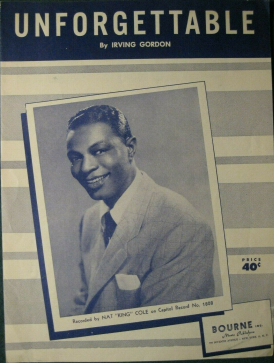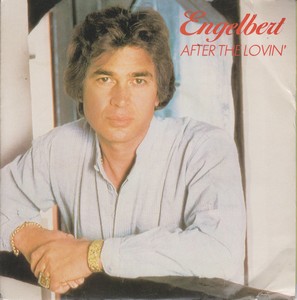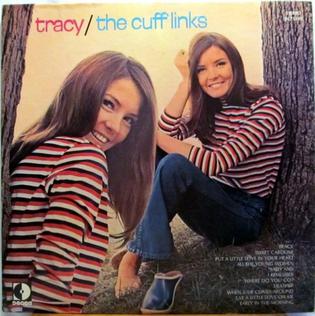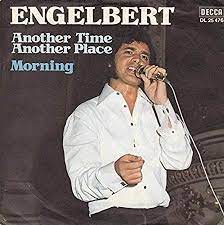
Arnold George Dorsey, known professionally as Engelbert Humperdinck, is a British pop singer who has been described as "one of the finest middle-of-the-road balladeers around". He achieved international prominence in 1967 with his recording of "Release Me".

Barbra Streisand is an American actress and singer. Her discography consists of 117 singles, 36 studio albums, 12 compilations, 11 live albums, and 15 soundtracks. According to the Recording Industry Association of America, Streisand is the second-best-selling female album artist in the United States with 68.5 million certified albums in the country, and a career total ranging from 150 to 200 million making her one of the best-selling music artists of all time.

"Unforgettable" is a popular song written by Irving Gordon. The song's original working title was "Uncomparable,” however, the music publishing company asked Gordon to change it to "Unforgettable.” The song was published in 1951.

"After the Lovin'" is a single performed by Engelbert Humperdinck, produced by Joel Diamond and Charlie Calello, and composed by Ritchie Adams with lyrics by Alan Bernstein. The single was a U.S. top-ten hit in late 1976/early 1977, reaching number eight on the Billboard Hot 100 and number five on the Cash Box Top 100. It became a RIAA gold record. It is ranked as the 61st biggest U.S. hit of 1977. The song also reached number 40 on the country singles chart and spent two weeks atop the easy listening chart. It was Humperdinck's final Top 40 Billboard hit.

Canadian singer Celine Dion has released 137 singles in both English and French discography as a lead artist. According to Billboard magazine, Dion is the world's best-selling contemporary female artist of all time. As of 2021, she has reportedly sold around 200 to 250 million records worldwide. Referred to as the "Queen of Power Ballads", Dion has released a string of worldwide hits, with "My Heart Will Go On" being her career's biggest hit, with estimated physical sales of over 18 million worldwide, making it the 2nd best-selling physical single by a woman in history. It reached over 117 million radio impressions during its peak, becoming the most-played radio hit in history and became the best-selling single of 1998 worldwide. "Because You Loved Me" is her biggest hit on the US Billboard Hot 100, spending six weeks atop the chart and selling six million copies in its first six months of availability worldwide. "Pour que tu m'aimes encore" was the 4th biggest hit of the 1990s in France and has sold over four million copies worldwide.

"Have I Told You Lately" is a song written and recorded by Northern Irish singer and songwriter Van Morrison for his nineteenth studio album, Avalon Sunset (1989). It is a romantic ballad that is often played at weddings, although it was originally written as a prayer.

"Baby, I Love Your Way" is a song written and performed by English singer Peter Frampton, released as a single in September 1975. It first featured on Frampton's 1975 album, Frampton, where it segues from the previous track "Nassau".

"The Most Beautiful Girl" is a song recorded by Charlie Rich and written by Billy Sherrill, Norro Wilson, and Rory Bourke. The countrypolitan ballad reached No. 1 in the United States in 1973 on three Billboard music charts: the pop chart, the country chart, and the adult contemporary chart, as well as in Canada on three RPM charts: the RPM 100 Top Singles chart, the Country Tracks chart, and the Adult Contemporary chart. Billboard ranked it as the No. 23 song for 1974.

"A Little More Love" is a song recorded by British-Australian singer Olivia Newton-John for her tenth studio album, Totally Hot (1978). Written and produced by Newton-John's long-time record producer John Farrar, the song was released as the lead single from Totally Hot in October 1978 and became a worldwide hit single.
"Moon Over Naples" is a 1965 instrumental composed and recorded by German bandleader Bert Kaempfert. The instrumental version reached No. 6 on Billboard's Adult Contemporary chart. It won a BMI Award in 1968.

"Do I Love You" is a song co-written and recorded by Paul Anka, from his 1972 eponymous LP. Released as an advance single in late 1971, "Do I Love You" reached number 14 on the Easy Listening Singles charts of both the U.S. and Canada, number 16 on the Canadian Pop chart, and was a modest hit on the U.S. Hot 100 as well. As with the earlier "My Way", it was adapted from a French-language song popularized by Claude François, and Anka composed the English lyrics.

"Quando m'innamoro" is a 1968 Italian song written by Daniele Pace, Mario Panzeri and Roberto Livraghi and sung with a double performance by Anna Identici and by The Sandpipers at the 1968 Sanremo Music Festival, in which it came 6th.
"With Pen in Hand" is a song written by Bobby Goldsboro and first released on his March 1968 album, Honey. The song's lyrics address the subjects of divorce and losing custody of one's child, and are sung from the perspective of the parent who expects to be losing custody of their child, as they make a final plea to their spouse to reconcile before the divorce is finalized. "With Pen in Hand" has been a hit for multiple artists in the late 1960 and 1970s.

"So Sad (To Watch Good Love Go Bad)" is a song written by Don Everly, which was released by The Everly Brothers in 1960. The song was later a country hit for multiple artists in the 1970s and 80s.

"Tracy" is a song written by Lee Pockriss and Paul Vance, the title track of the Cuff Links debut LP.
"Too Beautiful to Last" is a song recorded by Engelbert Humperdinck, which was the theme from the 1971 historical biopic Nicholas and Alexandra.
"Our Winter Love" is an instrumental composition by Johnny Cowell, which was a hit single for Bill Pursell. Pursell's version was recorded in 1962, and was released as a single in January 1963.
"Les Bicyclettes de Belsize" is a song written and composed by Les Reed and Barry Mason. Used as the theme song of the 1968 eponymous musical film, it was mimed by Anthony May in the movie and sung by Johnny Worth. As a 7" 45rpm single, it was a big hit that year, in parallel English and French versions, for Engelbert Humperdinck and Mireille Mathieu, respectively. The French version premiered on Mathieu's 1968 Columbia album Les Bicyclettes de Belsize; the English version premiered as a single in 1968, and was then included on Humperdinck's 1969 album Engelbert.
"The Way It Used to Be" is a song recorded by Engelbert Humperdinck, which was released on the album Engelbert and as a single in 1969. It is an English language adaptation of the Italian language song "Melodia", which was originally released by Isabella Iannetti in 1968.

"Another Time, Another Place" is a song by Engelbert Humperdinck, the title track of his 1971 LP. It became an international hit, reaching No. 13 in the United Kingdom and No. 16 in Canada.














